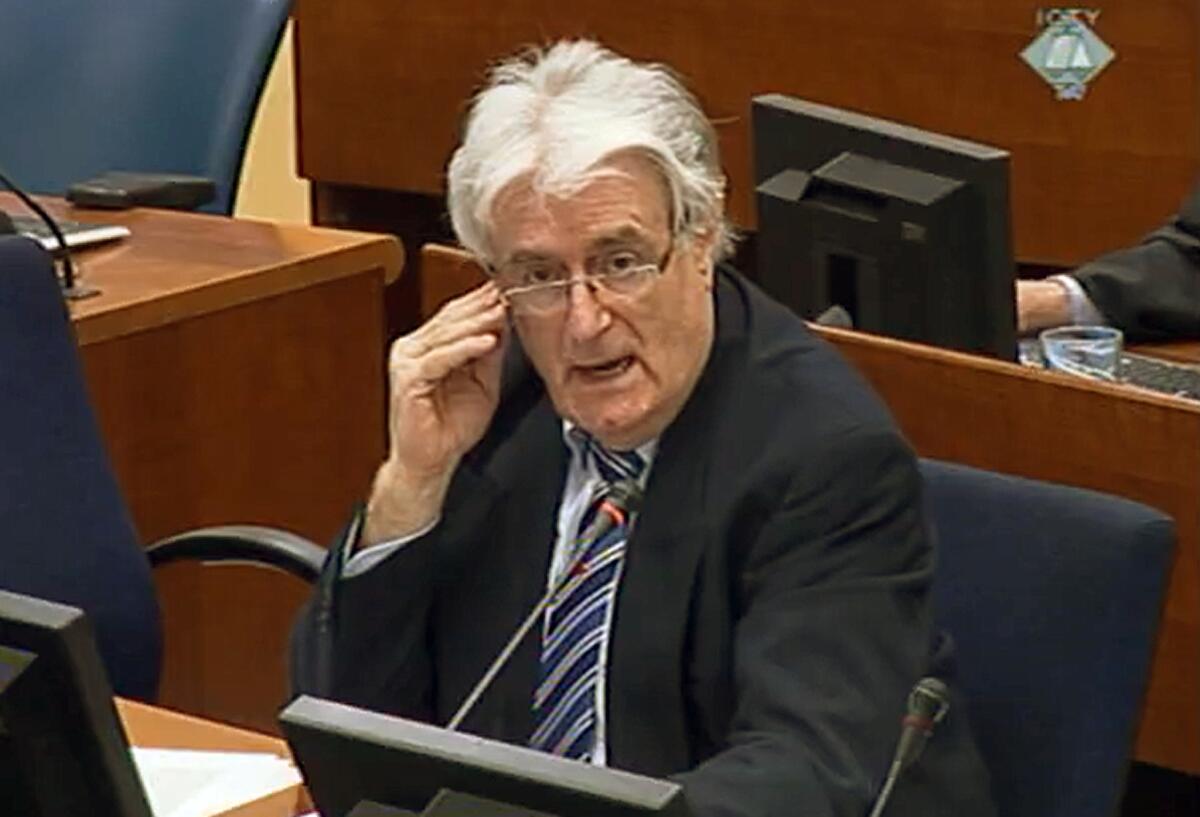Bosnian war crimes suspect Mladic must testify in Karadzic’s trial

- Share via
Bosnian Serb wartime leaders Radovan Karadzic and Gen. Ratko Mladic would be on trial together on charges of genocide and other war crimes if military commander Mladic hadn’t managed to remain a fugitive for three years longer than political leader Karadzic.
The general’s greater success in dodging international justice has put the two on trial in separate proceedings, allowing them to call each other to testify as defense witnesses and have each cast doubt on the truth behind the charges against the other.
It’s an ironic twist in the nearly two-decade effort to prosecute the two men accused of plotting and executing a policy of “ethnic cleansing” that displaced 2 million people and left at least 100,000 dead during the 1992-95 Bosnian war.
On Wednesday, the International Criminal Tribunal for the former Yugoslavia granted Karadzic’s motion to subpoena Mladic for the burly, white-haired political leader’s trial. Mladic had declined to testify voluntarily, citing his right to avoid self-incrimination.
But in court documents seeking the subpoena of Mladic, Karadzic’s lawyers gave a foretaste of the testimony they were hoping for in their client’s defense.
Mladic “is expected to testify that the joint criminal enterprises alleged in the [war crimes indictment] ... never existed and that he never informed the accused, orally or in writing, that ‘prisoners from Srebrenica would be, were being, or had been executed,’” the petition for subpoena stated.
The general, whose trial began in May 2012 but, like that of Karadzic, has been stop-and-go to accommodate claims of ill health and procedural challenges, is also in a position to back Karadzic’s claims of innocence on the indictment’s accusation that he was aware of the indiscriminate shelling of Sarajevo and targeting of civilians.
“Mladic’s testimony is necessary to rebut the claims by the Office of the Prosecutor that the Accused had ‘numerous sources from which he could have learned of the execution of prisoners from Srebrenica, including Mladic,’” the subpoena petition granted by the court said.
More than 8,000 Muslim men and boys were rounded up in the eastern Bosnian town of Srebrenica in July 1995 and summarily executed by Bosnian Serb forces under Mladic’s command. Karadzic and Mladic have denied responsibility for the massacre, the worst in Europe since World War II.
The subpoena request acknowledged that Mladic, as a defendant himself, has the right to refuse to answer questions “on the basis of his privilege against self-incrimination.” So Karadzic attested to the court that he would “keep the focus of his examination of General Mladic as narrow as possible,” the court papers said.
A November decision of the Yugoslav war crimes court in the case of convicted war criminal Zdravko Tolimir further protects witnesses from making incriminating disclosures, Karadzic’s legal team noted. The ruling a month ago cited procedural rules that prohibit use of compromising statements, “directly or indirectly,” in a case against the witness “and thus provides adequate protection to the tribunal’s accused if they are compelled to make incriminating statements when giving evidence in another case.”
Mladic has been uncooperative since his capture in northern Serbia in May 2011, after having evaded the war court’s indictment and arrest warrant for 15 years. He may continue to deny the Hague-based court’s legitimacy and refuse to answer questions when he is called to testify in defense of Karadzic when proceedings resume next month.
The general’s legal advisors, however, may see an opportunity to coordinate the two Serb defendants’ narratives to their mutual benefit if Mladic can undermine the contentions in the indictment against Karadzic.
Despite Mladic’s resistance to the initial request that he testify on Karadzic’s behalf, the two men believed to have masterminded the Bosnian horrors, who are jailed at the same tribunal detention facility, remain on good terms, Karadzic lawyer Peter Robinson told the Associated Press in The Hague.
If convicted at their separate trials, the maximum sentence the men can receive is life imprisonment.
Twitter: @cjwilliamslatcarol.williams@latimes.com
More to Read
Sign up for Essential California
The most important California stories and recommendations in your inbox every morning.
You may occasionally receive promotional content from the Los Angeles Times.









